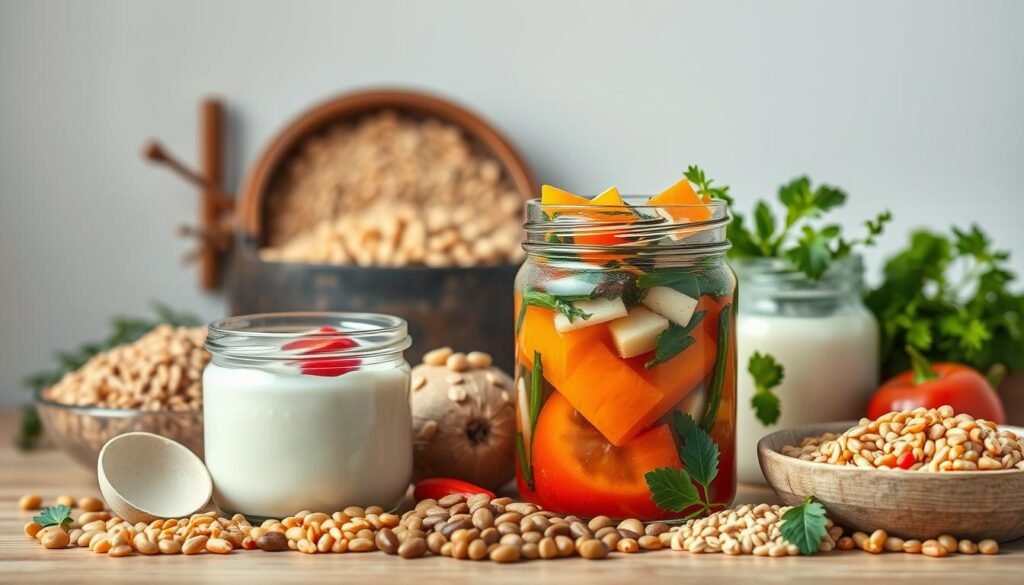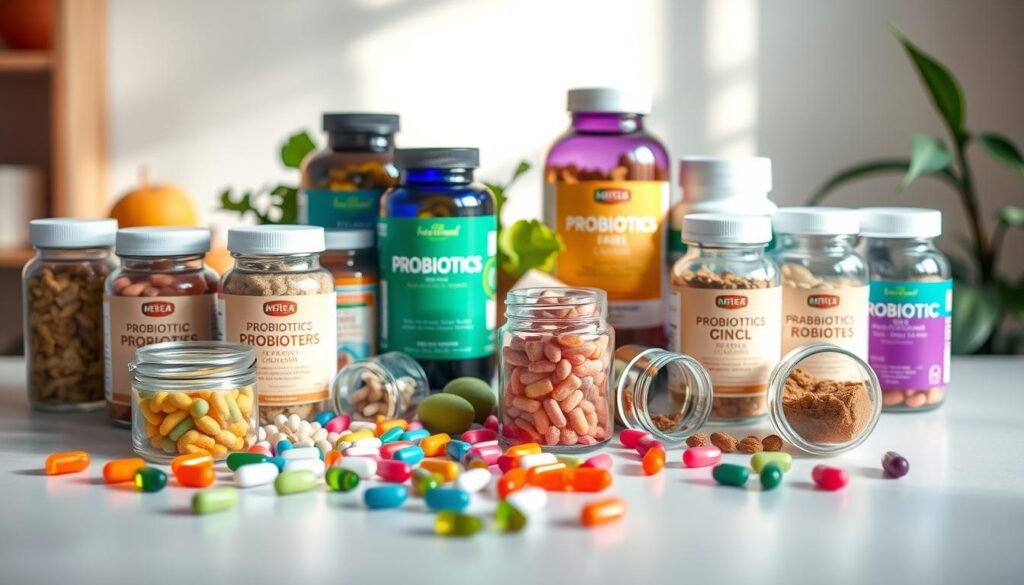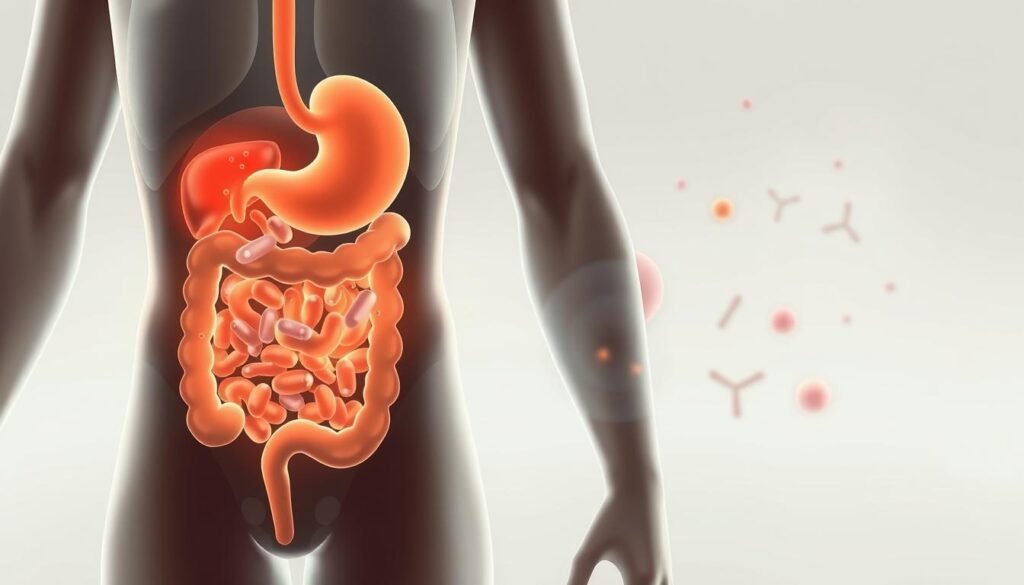Do you have trouble with bowel movements or feel uncomfortable in your stomach? You’re not alone. Millions of people around the world face gut health problems. This has made many wonder, do probiotics make you poop, and how they might support digestion.
Probiotics are live good bacteria that help when taken in the right amounts. They can be found in fermented foods and supplements. They help keep your gut microbiome balanced. A healthy gut is key for feeling good, affecting digestion, immune health, and more.

Key Takeaways
- Probiotics support a balanced gut microbiome.
- A healthy gut microbiome is vital for digestive health.
- Probiotics can be found in fermented foods and supplements.
- Keeping your gut microbiome balanced is important for overall health.
- Probiotics may ease digestive discomfort.
Understanding the Gut Microbiome and Digestive Health
Your digestive health is linked to the tiny world in your gut, called the gut microbiome. This tiny world helps with digestion, absorbing nutrients, and even affects your mood. It’s all connected through the gut-brain axis.
What Makes Up Your Gut Microbiome
The gut microbiome is full of trillions of tiny creatures like bacteria and viruses. They work together to keep you healthy. Having many different types of these tiny creatures is important for a strong digestive system.
The Delicate Balance of Intestinal Flora
Keeping your gut flora in balance is key to good digestion. If this balance is off, you might get sick. Things like what you eat, your lifestyle, and even antibiotics can affect this balance.
A healthy gut has more good bacteria. These good guys help break down food, make vitamins, and keep your immune system strong. They also stop bad bacteria from growing too much.
How Dysbiosis Affects Digestive Function
Dysbiosis, or an imbalance in your gut, can really mess with your digestion. You might feel bloated, have stomach pain, or have trouble going to the bathroom. Here’s how dysbiosis can affect your gut:
| Dysbiosis Effects | Symptoms | Potential Consequences |
|---|---|---|
| Imbalanced Gut Bacteria | Bloating, Gas | Discomfort, Malabsorption |
| Reduced Microbial Diversity | Diarrhea or Constipation | Malnutrition, Weakened Immunity |
| Increased Pathogenic Bacteria | Abdominal Pain, Inflammation | Infections, Chronic Diseases |
It’s important to understand how your gut microbiome affects your health. Knowing this can help you take care of your gut. This way, you can avoid problems caused by an unbalanced gut microbiome.
What Are Probiotics and How Do They Work?
Probiotics are good bacteria that help your digestive health. They are live microorganisms that give health benefits when taken in the right amounts. These good bacteria keep your gut healthy.
Defining Probiotics: The Good Bacteria
Probiotics are helpful bacteria and yeasts for your health, mainly your digestive system. The most used probiotics are from Lactobacillus and Bifidobacterium genera. They keep your gut microbiome balanced, which is key for health.
Lactobacillus is in foods like yogurt and kefir. Bifidobacterium is in the colon and boosts your immune system.
Common Probiotic Strains and Their Functions
Each probiotic strain does something different. For example, Lactobacillus acidophilus helps with digestion. Bifidobacterium lactis boosts your immune system and helps your gut move food better. Knowing what each strain does helps pick the right probiotics for you.
- Lactobacillus rhamnosus: Helps prevent and treat diarrhea.
- Bifidobacterium breve: Boosts your immune system and improves gut health.
- Saccharomyces boulardii: A yeast probiotic for managing diarrhea and gut issues.
The Difference Between Probiotics, Prebiotics, and Synbiotics
Probiotics are live good bacteria. Prebiotics are fibers that feed these bacteria, helping them grow. Synbiotics mix probiotics and prebiotics for better gut health.
Knowing the difference helps you choose the best for your gut. Mixing probiotics with prebiotics creates a synbiotic effect for better health.
Do Probiotics Make You Poop? The Direct Connection
Probiotics are live microorganisms that help our digestive health. They can change how often we poop. This is because they affect our gut in many ways.
How Probiotics Influence Bowel Movements
Probiotics can change our bowel movements in several ways. They help keep the good bacteria in our gut balanced. They also make our gut stronger and help our immune system.
Some probiotics make short-chain fatty acids. These acids help our gut move food better. This can make us poop more often.
Studies show that Bifidobacterium and Lactobacillus are good for our gut. They help the good bacteria grow and keep the bad ones down.
Effects on Stool Consistency and Frequency
Probiotics can make our stool better or worse, depending on the type and amount. They can make us poop more if we’re constipated. Or, they can make our stool less loose if we have diarrhea.
| Probiotic Strain | Effect on Stool Consistency | Effect on Stool Frequency |
|---|---|---|
| Bifidobacterium lactis | Improves stool consistency | Increases stool frequency |
| Lactobacillus rhamnosus | Firms up loose stools | Regulates bowel movements |
| Streptococcus thermophilus | Enhances gut motility | Improves bowel regularity |
Timeframe: When to Expect Results
When probiotics start working can vary. Some people see changes in a few days. Others might take weeks.
How fast you see results depends on the probiotic, how much you take, and your gut.
Being patient and consistent is key when taking probiotics. If you want to try them for regular bowel movements, talk to a doctor. They can help you choose the right one for you.
Probiotics for Constipation Relief

Probiotics are getting more attention for helping with constipation. Many people struggle with constipation, which can be uncomfortable and disrupt daily life. Knowing how probiotics help can guide people in adding them to their health routine.
Most Effective Strains for Constipation
Some probiotic strains are good for constipation. Lactobacillus acidophilus is one that has been studied for its benefits. Other strains like Bifidobacterium lactis and Lactobacillus rhamnosus also help with bowel movements and stool.
| Probiotic Strain | Effect on Constipation | Key Benefits |
|---|---|---|
| Lactobacillus acidophilus | Improves gut motility | Enhances digestive health, supports immune system |
| Bifidobacterium lactis | Increases stool frequency | Improves gut barrier function, reduces symptoms of IBS |
| Lactobacillus rhamnosus | Regulates bowel movements | Supports gut health, may reduce bloating |
Mechanism of Action for Improving Gut Motility
Probiotics can change the gut microbiota. They help intestinal muscles contract better and improve hormone secretion. This helps stool move faster, preventing constipation.
Research on Bowel Transit Time Improvement
Studies show probiotics can shorten bowel transit time. This helps with constipation. Eating probiotic-rich foods or taking supplements can improve bowel habits.
Understanding probiotics’ role in constipation relief is key. They offer a natural way to manage constipation. Adding probiotics to your routine can be a helpful step.
Probiotics for Diarrhea and Loose Stools
Diarrhea and loose stools can be really tough. But, probiotics might help a lot. If you have diarrhea that won’t go away, probiotics could be a good choice.
Firming Up Loose Stools with Probiotics
Probiotics, like Saccharomyces boulardii, can make loose stools better. This yeast probiotic is strong and works well in the intestines.
Saccharomyces boulardii helps the gut in many ways. It balances the gut microbiome, makes the intestines stronger, and helps the immune system. This reduces inflammation.
Effectiveness for Different Types of Diarrhea
Probiotics work differently for different types of diarrhea. They’re good for antibiotic-associated diarrhea and traveler’s diarrhea. Studies show they can make these conditions less severe and shorter.
When picking a probiotic for diarrhea, look at the strain and CFU. You need a product with enough CFU (1-10 billion) and the right strain for you.
Recommended Strains and Dosages
For diarrhea, some top probiotic strains are:
- Saccharomyces boulardii: Great for many types of diarrhea.
- Lactobacillus rhamnosus: Helps with the immune system.
- Bifidobacterium lactis: Boosts gut barrier function.
| Probiotic Strain | Recommended Dosage | Benefits |
|---|---|---|
| Saccharomyces boulardii | 1-2 billion CFU/day | Reduces duration and severity of diarrhea |
| Lactobacillus rhamnosus | 1-10 billion CFU/day | Enhances immune function, reduces diarrhea incidence |
| Bifidobacterium lactis | 1-5 billion CFU/day | Improves gut barrier function, alleviates diarrhea |
When picking a probiotic supplement, check the label for strain and CFU. This ensures the product can help with your diarrhea.
Probiotics and Digestive Conditions

Probiotics can help those with digestive issues. They are key for good health. Conditions like IBS, IBD, and SIBO can really hurt your life.
Managing IBS Symptoms with Probiotics
IBS affects the large intestine. It causes pain, diarrhea, constipation, and bloating. Probiotics can help by balancing gut bacteria. Strains like Bifidobacterium and Lactobacillus work well.
| Probiotic Strain | Effect on IBS Symptoms |
|---|---|
| Bifidobacterium infantis | Reduces abdominal pain and bloating |
| Lactobacillus acidophilus | Improves bowel habits and reduces symptoms |
| Streptococcus thermophilus | Enhances gut barrier function |
Probiotics for Inflammatory Bowel Disease
Inflammatory bowel disease includes Crohn’s and ulcerative colitis. It causes long-term inflammation in the gut. Probiotics may help by reducing inflammation and healing the gut.
Addressing SIBO and Other Gut Imbalances
SIBO is when bacteria grow too much in the small intestine. Probiotics can help by improving gut movement and reducing bacteria. They also help with other gut problems by strengthening the gut and controlling the immune system.
In short, probiotics are a great way to manage digestive issues like IBS, IBD, and SIBO. Knowing which probiotics to use can help improve your digestive health.
Food Sources of Natural Probiotics
Eating foods full of natural probiotics can help your gut health. Probiotic supplements are popular, but a diet rich in probiotics is just as good for your digestion.
Probiotics are live bacteria that help your health when eaten in the right amounts. Fermented foods are a main source of these good bacteria. Adding fermented foods to your meals can help keep your gut healthy.
Fermented Foods and Their Probiotic Content
Fermented foods are full of probiotics because of the bacteria that grow during making them. Foods like yogurt, sauerkraut, kimchi, kefir, and kombucha are great. They not only have probiotics but also vitamins, minerals, and antioxidants.
Common Fermented Foods and Their Probiotic Benefits:
- Yogurt: Has Lactobacillus acidophilus and Bifidobacterium bifidum for better digestion.
- Sauerkraut: Is full of Leuconostoc, Lactobacillus, and Pediococcus for gut health.
- Kimchi: A Korean dish with many lactic acid bacteria.
- Kefir: A fermented milk with probiotic bacteria and yeast.
- Kombucha: A fermented tea with SCOBY (Symbiotic Culture of Bacteria and Yeast).
Dairy vs. Non-Dairy Probiotic Foods
Dairy products like yogurt and kefir are known for their probiotics. But, non-dairy options are getting more popular, too. This is because of dietary needs or preferences.
Comparison of Dairy and Non-Dairy Probiotic Foods:
| Food Type | Probiotic Content | Examples |
|---|---|---|
| Dairy | High | Yogurt, Kefir, Cheese |
| Non-Dairy | Variable | Sauerkraut, Kimchi, Kombucha, Non-dairy yogurt alternatives |
Building a Probiotic-Rich Diet
To add probiotics to your diet, follow these tips:
- Start with fermented foods you like, like yogurt or sauerkraut.
- Try new recipes with probiotic-rich ingredients.
- Look at non-dairy options if you have dietary limits.
- Be regular: Eating probiotics often is important for a healthy gut.
By eating a variety of probiotic-rich foods, you can help your digestion and overall health.
Choosing the Right Probiotic Supplement

Choosing a probiotic supplement is about knowing what you need. There are many products out there. It can be hard to pick the right one for you.
Understanding CFUs and Potency
CFU (Colony-Forming Units) count is key when picking a probiotic. CFUs show how many live bacteria are in the product. But, a higher CFU count doesn’t always mean it’s better.
It’s also about the type of bacteria and how they’re mixed. For example, a product with fewer CFUs but the right bacteria might be better than one with more CFUs but wrong bacteria.
CFU counts usually range from 1 billion to 100 billion per serving. The right CFU count for you depends on your health needs and why you’re taking it.
Single-Strain vs. Multi-Strain Formulations
Probiotics can have one or many types of bacteria. Single-strain ones focus on one benefit, like gut health. Multi-strain ones offer more benefits by combining several strains.
A study in the Journal of Clinical Gastroenterology found that multi-strain probiotics might be better. They can change the gut microbiota in a wider way.
Delivery Systems: Enteric Coating and Shelf Stability
The way a probiotic is delivered is very important. Enteric coating helps protect the bacteria from stomach acid. This coating lets the capsules dissolve in the intestines, where the bacteria can grow.
Shelf stability is also key. Some probiotics need to be kept cold to stay potent. Others can be kept at room temperature. Think about your lifestyle and if you can keep your supplement cold.
“The right probiotic can make a big difference in your digestive health. But, it’s important to pick a product that’s scientifically backed and has a good delivery system.”
This quote highlights the need for a high-quality probiotic supplement.
How to Take Probiotics for Maximum Benefit
To get the most from probiotics, knowing how to use them is key. How well probiotics work depends on when you take them, with or without food, and with other foods like prebiotics.
Timing: When to Take Your Probiotics
When you take probiotics matters a lot. Taking them on an empty stomach helps them survive better. Try taking them in the morning before eating or before bed, based on what works for you.
Some say to take them 30 minutes before eating to protect them from stomach acid. But, the best time can change based on the probiotic and your body. Always follow the maker’s advice or talk to a doctor.
With or Without Food Considerations
Deciding to take probiotics with or without food is important. Food can help protect them from stomach acid. But, some strains do better on an empty stomach. It’s all about what your probiotics need.
An expert once said, “The survival of probiotic bacteria through the stomach is key. Taking them with or without food can really affect their success.”
“Probiotics are live microorganisms that confer a health benefit when administered in adequate amounts.”
Combining with Prebiotics for Enhanced Effects
Adding prebiotics to probiotics makes them work better. Prebiotics are fibers that feed probiotics, helping them grow. Foods like inulin and fructooligosaccharides (FOS) are good sources or can be supplements.
Together, probiotics and prebiotics create a synbiotic effect that boosts gut health. This mix can help beneficial bacteria grow, strengthen the gut, and support the immune system. Adding prebiotic foods or supplements can enhance your probiotics’ benefits.
Potential Side Effects and Precautions

Probiotics are usually safe, but some people might feel a bit uncomfortable when they start. It’s good to know about possible side effects to help you make smart choices for your gut health.
Common Digestive Discomfort When Starting Probiotics
Starting probiotics might make you feel a bit off at first. You might notice:
- Bloating
- Gas
- Abdominal cramps
- Changes in bowel movements
These feelings are usually mild and go away in a few days to a week. But if they don’t get better or get worse, you should talk to a doctor.
When to Be Concerned About Side Effects
Most people do fine with probiotics, but some should be careful. If you have:
- Severe abdominal pain
- Persistent diarrhea or constipation
- Blood in your stool
- Fever or chills
you need to see a doctor right away. These signs might mean you have something serious that needs to be checked.
Who Should Exercise Caution with Probiotics
Some people should be extra careful with probiotics. This includes:
- People with weakened immune systems (like HIV/AIDS or those on chemotherapy)
- Those who are very sick or have had surgery recently
- Anyone who has had problems with probiotics before
- Pregnant or breastfeeding women (it’s usually safe, but check with a doctor)
Talking to a healthcare professional before starting any new supplement is always a good idea, even more so if you have health issues.
Knowing about possible side effects and being careful can help you enjoy the benefits of probiotics for your digestive health.
The Science Behind Probiotics and Digestive Health
Probiotics and gut health are getting more attention. It’s important to look at the science behind them. They might help our digestive system a lot.
Current Research and Clinical Studies
Many studies have looked into how probiotics help our digestion. Clinical trials show they can help with IBS, IBD, and other gut problems.
Probiotics might also change our gut bacteria for the better. They help keep our gut healthy. Some probiotics even make good stuff that helps our gut work right.
Limitations in Probiotic Research
Even though the research is promising, there are some big challenges. One problem is that not all probiotics are the same. What works for one might not work for another.
Also, not all probiotic products are the same. How they’re made, stored, and kept can change their quality. This means we need to make sure they’re safe and work well.
What Medical Professionals Say About Probiotics
More doctors are seeing the good in probiotics for our digestion. They think probiotics can be a big help for some gut problems.
There’s a lot of evidence supporting the use of probiotics in medicine. Doctors are starting to suggest certain probiotics for specific issues. But, we need more research to really understand how they work best.
Conclusion: Integrating Probiotics for Optimal Digestive Health
Probiotics are key for a healthy gut microbiome. This is vital for good digestion. Adding probiotics to your daily life can help your gut health a lot.
They can make your bowel movements regular. They also help with digestive problems and keep your microbiome balanced.
You can get probiotics from fermented foods or supplements. When picking a supplement, look at CFU count, strain diversity, and how it’s delivered. This ensures you get a good product for your needs.
By choosing wisely, you support your digestive health and well-being. This is a smart way to care for your gut and improve your life.
FAQs
What are probiotics and how do they work?
Probiotics are live microorganisms that help our health. They keep our gut microbiome balanced. This balance is key for our overall well-being.
Can probiotics help with constipation?
Yes, probiotics like Lactobacillus and Bifidobacterium can help with constipation. They make our gut move better and help us go to the bathroom regularly.
How do probiotics affect bowel movements?
Probiotics help our bowel movements by balancing our gut. They make our stool better and help us go more often. This helps with both constipation and diarrhea.
What is the difference between probiotics, prebiotics, and synbiotics?
Probiotics are live good bacteria. Prebiotics are fibers that feed these bacteria. Synbiotics are a mix of both, helping our gut stay healthy.
Can probiotics help with irritable bowel syndrome (IBS)?
Yes, some probiotics can ease IBS symptoms. They help with bloating, pain, and irregular bowel movements. They also reduce inflammation in the gut.
Do probiotics make you lose weight?
Some probiotics might aid weight loss by balancing gut bacteria, improving digestion, and reducing inflammation, but they’re not a standalone solution for losing weight.
Can probiotics cause diarrhea?
Yes, when starting probiotics, some people might experience mild diarrhea or loose stools as their gut microbiota adjusts. This typically resolves in a few days.
Can probiotics make your poop soft?
Probiotics can indeed soften your stool by enhancing gut motility and hydration, which helps maintain regular bowel movements.
What are the signs your probiotics are working?
Signs your probiotics are working include improved digestion, regular bowel movements, reduced bloating, and better overall gut comfort.
Can probiotics affect bowel movements in babies?
Yes, probiotics can help regulate bowel movements in infants, reducing symptoms of colic and improving digestion. Always consult a pediatrician before use.
Are there risks of taking too many probiotics?
Taking excessive probiotics may cause gastrointestinal discomfort, such as bloating, gas, and diarrhea. Moderation is key for safety and effectiveness.
Why might probiotics worsen symptoms initially?
Initially, probiotics might increase symptoms like gas or bloating due to gut bacteria changes. Usually, this improves as your gut microbiome adjusts.
How do I choose the right probiotic supplement?
Look at the CFU count, strain, and delivery system of the probiotic. Make sure it’s effective and stays stable.
Can I get probiotics from food sources?
Yes, you can get probiotics from foods like yogurt, kefir, sauerkraut, and kimchi. Also, from probiotic-rich dairy and non-dairy products.
Are there any potentially side effects of taking probiotics?
Probiotics are usually safe but can cause discomfort like bloating or gas. This is more common when you first start taking them.
Can probiotics help with diarrhea?
Yes, some probiotics, like Saccharomyces boulardii, can firm up loose stools. They help with diarrhea by balancing the gut and reducing inflammation.
How long does it take to see results from probiotics?
Results from probiotics vary. It depends on the person, the probiotic strain, and the health issue. Some see benefits in days or weeks.
Can I take probiotics with prebiotics?
Yes, taking probiotics with prebiotics, or synbiotics, can be beneficial. Prebiotics feed the good bacteria, helping our gut stay healthy.
Are probiotics suitable for everyone?
Probiotics are generally safe but not for everyone. People with weak immune systems or serious health issues should talk to a doctor before taking them.
What is the role of the gut-brain axis in digestive health?
The gut-brain axis is a network between our brain and gut. It’s key for our digestive health, mood, and thinking.
Can probiotics help with gut inflammation?
Yes, some probiotics have anti-inflammatory effects. They can reduce gut inflammation and help heal conditions like inflammatory bowel disease.
How do probiotics impact the gut microbiota?
Probiotics help keep our gut microbiota balanced. They grow good bacteria, reduce bad bacteria, and increase diversity in our gut.

